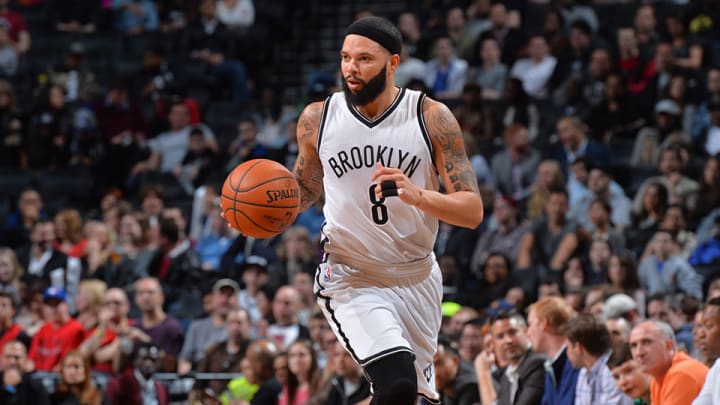Consolation prize Deron Williams makes practical fit for Mavs' offense

Logistically, the Dallas Mavericks will soon be forced to deviate from both the team they were last season and the team they’d hoped to be in the coming year. Whatever plans were intended for DeAndre Jordan’s arrival will need be scrapped on the basis of the Mavs’ dramatically different personnel. The standby systems Dallas relied on last season, too, will need significant adjustment without Monta Ellis initiating off the dribble and Tyson Chandler challenging defensive rotations with his every roll. Fielding a new team sets a new baseline—one that will be authored in significant part by point guard import Deron Williams.
That name carries with it the baggage of regression. Even the most casual basketball fans are cognizant of the fact that Williams isn’t the player he once was; we can already say with certainty that the best seasons of Williams’s career are behind him. Some, however, will stretch the impression of that career shift to mean something beyond what it has during his playing decline. Williams isn’t a perennial All-Star or fit to be the lead creator on any quality team. He is, however, still a perfectly useful, mid-tier starter with plenty to offer a team like the Mavericks in spite of his new trajectory.
Deron Williams signing helps Mavs cope with current circumstances
had confined Parsons into a very specific role. Williams broadens those parameters in a way that could allow for healthy, natural growth.
Dallas would surely be better off if Williams could get to the basket and, as has not been the case in years, finish there effectively. Still, the Mavs under Rick Carlisle have proven capable of creating good shots for athletically limited guards through several iterations. The exact mechanisms used to create those opportunities (beyond playing off of Dirk Nowitzki) will need to change in accordance with Dallas’ new makeup. Regardless, Carlisle and his staff tend to find a way. One of the most buoyant coaching staffs in the league will find the means to make efficient use of this roster's particular instruments—even if Dallas no longer has any driver of Ellis’s caliber or roll option of Chandler’s potency.
Williams can be a pivotal part of that. There’s no need to funnel an offense through Williams as with Ellis because the returns wouldn’t warrant it and Williams’s skills off the ball create other options. Even still, it’s not as if Williams is a purely complementary sort; Williams ranked in the top 15 in assist percentage last season and does a nice job of leading his teammates with bounce passes in traffic. When facing pressure on the ball, Williams is also quick to wheel back out to reverse the ball to the other side of the floor. This isn’t as brutally effective as the cross-court feeds that some of the best passers in the league can execute, but it’s a solid workaround all the same that yields good opportunities for Williams’s teammates.
• MORE NBA: Mavs' off-season grade | Rivers discusses Jordan chaos
The sum of those contributions will add value to the Maverick offense, particularly relative to the overmatched alternatives of Devin Harris, J.J. Barea, and Raymond Felton. Williams is both the best option at the point among them and a likely candidate to play alongside them. Dallas’ roster construction is as such that it could use a bigger guard like Williams to balance two-guard lineups (particularly if Wesley Matthews misses time or has his minutes capped), balancing his roles with and without the ball. That kind of arrangement might actually better suit Williams’s defense at this stage, given that he doesn’t have the lateral agility to slide and scamper with top point guards on a play-to-play basis. Guarding the two comes with its own distinct challenges but also a more forgiving matchup set for a player in Williams’s position.
Crucial in all of this is the understanding of what Williams can and cannot do. He can help if put in the right positions to succeed and if flanked with the right kinds of load-bearing teammates. He cannot be an impact scorer on any regular basis or run an efficient offense as a dominant ball handler. Dallas both seems to understand these things implicitly and has a history of building form-fitting roles for talented, if complicated, players. Williams could find a satisfying place on a decent Mavericks team if he’s willing to play along, accept Carlisle’s coaching, and engage with a role that could draw upon the fundamental skills that have endured his decline.

Rob Mahoney is an NBA writer dedicated to the minutiae of the game of basketball, its overarching themes and everything in between. He joined the Sports Illustrated staff in 2012.